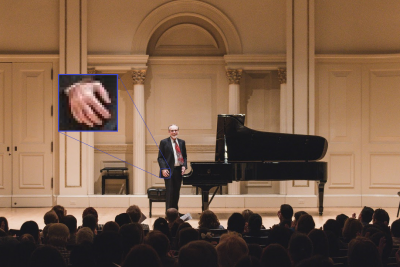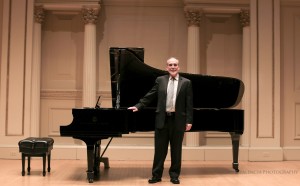As a child I liked my small hands. They seemed appropriate for the son of writers. Marco Rubio‘s “if your hands are small we all know what else is small” exchange with Donald Trump was decades away.
Delicate hands
My mother told that me I had delicate hands. This became a metaphor for my life. Early in my career I had to fire someone. I could not do it, so I sat in my boss’s office to learn from a man with larger hands. But when he spoke to the employee, he stumbled verbally. He was as sensitive as I, large hands notwithstanding.
Large Hands, Small Hands
If having big hands doesn’t make life easier, then having small hands shouldn’t make it more difficult. Or so I thought, until I took up learning the piano. I was half a century past the age when our hands are pliable enough to adapt physically to the instrument.
Rachmaninov, Liszt
At my first piano lesson, I could with forethought play an octave (an eight-note spread). A ninth was uncomfortable and a tenth impossible. I bought the scores of my favorite Rachmaninov piano preludes, but they contained chords that were too wide for my small hands. My dreams were shattered: I would never be able to wrap my fingers round the works of large-handed composers such as Liszt and Rachmaninov.
Virtual Hands
My teacher’s hands are tiny and yet she is a concert pianist, so I asked her about those tenths, those 6-note chords and those unreachable arpeggios. I learned that what is written may not be what is played, and the audience may not notice or may not care. You can omit a note from a chord. You can break or arpeggiate a chord to reach unreachable notes. Such techniques create the illusion that you have played what you cannot play, making your virtual hand larger than your real one.
Sleight Of Hand
It is one thing to be aware of such techniques, and quite another to brave a piece that requires sleight of hand. But I am becoming aware, as my second year as an adult beginner pianist comes to a close, that something has happened to my hands. Those octaves are now easy, and a 9-note spread such as those in Beethoven’s Moonlight first movement no longer leaves my right hand hurting for days. Rachmaninov remains a challenge, but ever since I saw this exquisite performance by Marijan Djuzel I have had my eye on Rachmaninov’s Prelude Opus 23 No. 10 (watch this video, it’s impressive).
Does playing the piano change your hands?
A couple of weeks ago I got to play Chopin in New York. In a photograph taken at the time, I noticed that my right hand looks different. This might just be an illusion caused by loose, warmed-up hands, but I prefer to see it as a Lamarckian response to the demands of the piano. My hands appear to have gotten larger.


You must be logged in to post a comment.